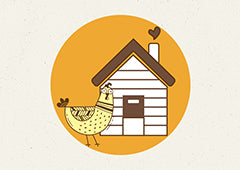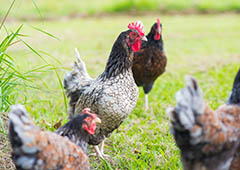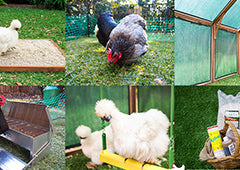Raising chickens can be a wonderful experience, especially if you plan to keep them as pets. If you first obtain your chickens as baby chicks, you will likely notice they go through many changes during their first year of life. By the time they are just a few weeks of age they will be ready to transition outside and are actually quite self-sufficient, although they will still need some protection.
During the first six months or so you can still expect your flock to go through a variety of changes as they develop their wattles and combs and your hens begin to lay. As your chickens continue to grow and develop there are a few things you should be aware of.
Molting
If you have kept a flock of chickens, you have more likely experienced chickens molting. No need to panic as Chickens molting occurs annually. During the molting period your chickens will shed and then re-grow some of their feathers. There is no need to be concerned about this as it is perfectly natural and normal. When you see your flock molting chicken feathers, you might be surprised at how bedraggled your flock will appear during this time, but take note it will not last and they will re-grow their feathers. This typically occurs during the warmer months. You should also be aware that you won't get eggs while your hens are onto molting chicken feathers. Once again, do not be concerned. This is not a problem related to illness.
Bringing New Chickens Into Your Flock
Raising Chickens is fun. You might also decide at some point that you would like to introduce new hens into your existing flock. They can be irresistible! Take note; however, that introducing new chickens into your flock can be stressful for the chickens you already have as well as for your new birds. One of the reasons for this is that flocks of chickens develop into a distinctive pecking order and you can be certain every chicken in that flock is well aware of their position in that hierarchy. When you introduce a new chicken, everything can be thrown in chaos. This can sometimes result in chickens becoming aggressive and literally picking on one another. In most instances, this does not last long and a new pecking order will be established.
Be aware that it is often a good idea to quarantine new adult birds before you introduce them to your flock. You should quarantine the new birds for about four weeks to help prevent the spread of any communicable diseases or infections. You certainly do not want your entire flock becoming ill! Keep in mind that it is always best to follow this step even if you purchase chickens from someone who is trustworthy. There is always the risk that the bird you purchased may have a problem the seller or hatchery was not aware of it and the risk to the rest of your flock is simply too great. Quarantining them is the best way to prevent what can be a huge problem. It is much better to cope with one sick chicken than an entire flock of ill birds.
When you are ready to finally introduce your new chickens to an existing flock, make sure you begin by allowing them to first see one another without providing them actual physical contact. One way to do this is to place the new chickens in the run but use some chicken wire to separate them from the existing flock. This will help them to become acquainted with one another without worrying about the new bird being pecked to death! Make sure you provide the new chicken with access to food and water if you choose to do this. It may take a week or so for your chickens to make the necessary transition and be ready to be in the same physical space with one another. It is time well spent!
Keeping chickens as pets can be a wonderful and rewarding experience. The benefits of keeping chickens as pets can be numerous, including egg production as well as the ability to interact with creatures that are decidedly adorable. Many people grow quite attached to their pet chickens and enjoy raising chickens! If you have young children or grand children, the experience of with chickens will be even more rewarding.
While chickens are not terribly complicated or difficult to care for, there are certainly a few things to keep in mind, especially if you are a beginner. Following the guidelines presented here in raising chickens will give you a good idea of what you can expect, how to prepare for your first chicks and how to best keep your chickens happy and healthy.



















